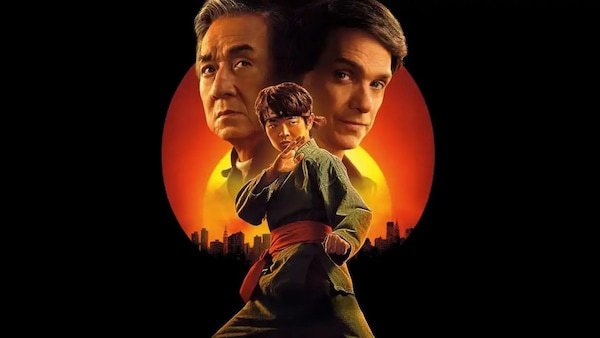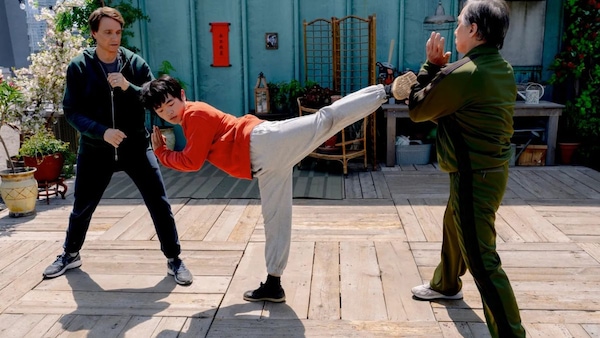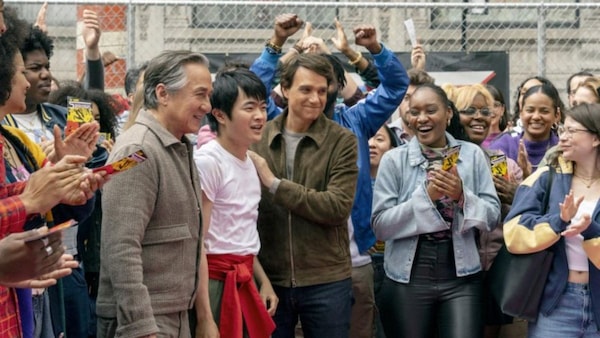Karate Kid: Legends Is The Crown Jewel Of Hollywood Mediocrity
Karate Kid: Legends single-handedly undoes the nostalgia and cultural impact of every single Karate Kid story in the last four decades.

Promo poster for Karate Kid: Legends
Last Updated: 01.09 PM, May 30, 2025
THE LAST FEW YEARS have been spent watching the downfall of mainstream Hindi cinema. I’ve reviewed so many atrocious Bollywood movies that I often sound like a bitter Indian dad citing the example of the exemplary “Sharma-ji Ka Beta” when I write about a foreign film. I can’t help but compare — and wave my finger disapprovingly at my litter. But once in a while, an absolutely horrid Hollywood movie like Karate Kid: Legends arrives (last year it was Madame Web), and all feels right with the world. The mediocrity is almost soothing because, as an Indian cinephile, it doesn’t feel so lonely anymore. They can be just as bad as us; it feels so nice to say that. We’re all in this together: divided by borders but united by bad cinema.
Karate Kid: Legends single-handedly undoes the nostalgia and cultural impact of every single Karate Kid story in the last four decades. If anything, it makes us question the sanctity of the past entries. It is so annoyingly assembled, half-hearted, poorly shot, haphazardly edited, tropey, cash-grabbing and lazy that I’ve seen 30-second influencer reels and animated Panda franchises with better emotional and production values. A sequel to the underrated Jaden Smith-starring The Karate Kid (2010) and the Cobra Kai Netflix series, this mercifully short 95-minute dumpster fire revolves around a Chinese boy, Li Fong (Ben Wang), who gives up kung fu in Beijing and moves to New York with his doctor-mother. She forces him to stop fighting because he has a dead brother who was killed by a bitter rival after winning a tournament. So, of course, he fights again. His teacher, Mr. Han (Jackie Chan), who was once a grieving janitor-turned-shifu in The Karate Kid, isn’t done with him.

Li’s American accent isn’t explained till around 10 minutes in, when the local white girl dutifully asks the question we’re all stumped about. His explanation — that he studied at an American school in Hong Kong — rivals the corny London backstory that most Katrina Kaif characters are given to justify her accent. Not once does Li look or sound like the new outlier on the block, and in no time, there’s a campy and unimaginative Karate-champ bully, a love interest, her middle-aged father who wants to get back to amateur boxing under this kid’s tutelage (go figure), a ‘Five Boroughs’ underground martial arts competition (whose final is on the terrace of a skyscraper during the longest twilight hour ever), and not one but two throwback mentors because it’s been a long franchise. Once the pizzeria is in trouble and the boxer-owner is hospitalised (because Li sucked as a teacher), the kung-fu expert sets out to fight the 80s-Bollywood-coded bully in a Karate tournament for a cash prize.
As a brown South Asian, my inherent racism of not being able to tell one Asian martial art from the other has only been exacerbated by a film that treats kung fu as the O-positive (universal donor) of fighting: everything is kung fu, apparently, including the kneading of pizza dough and sex. No, not sex, this is a PG-13 rated film. I was kidding. Mr. Han and Daniel LaRusso train young Li, and it would’ve been a disgrace if he still lost despite having two legends in his corner — compared to the bully’s Shekhar Malhotra-style arrogance and his Grease Lightning-reject coach. In terms of choreography, I’m yet to see a film with camerawork that’s so detached and clueless about action (it’s like sports in a Karan Johar movie, or feminism in a Sandeep Reddy Vanga film). The extreme close-ups and jittery handheld vibes are terribly placed, making every bout look like a Marvel climax on a hallucinatory trip. Not to mention the pacing, which makes the movie seem like it’s in a hurry to take the subway home before a war breaks out.

The tournament itself is sped through as if it’s almost ashamed to be seen. Before we know it, Li is in the Final, and the background of the skyscraper looks like an AI-generated motion poster called “sunset”. I’m not sure why Li feels the need to suddenly fight again; he already belongs to America, Mr. Han lands up there like he was a 2-hour flight away, and we never see enough of Li’s life in China to even show that he misses something. The screenplay operates on vibes. He’s more of a concept than a person: an Asian-American boy pretending to be Asian in the most American setting because what would a Karate Kid story be without some forced cross-cultural wiring?
Also, why do the baddies need to act so frightfully fake and boring? Does the city have a brawler waiting at every corner? Why is it that the subplot of a single dad wanting to get back into the ring to keep loan sharks at bay is more interesting than the actual plot of the film? Why is there nobody from Chinatown watching the fights? Why are the stunts so vanilla? Why is the fan service worse than MCU post-credit scenes? Why does Jackie Chan use a quote from the Rocky franchise to inspire Li? Why is this nonsensical sequel getting better reviews than the Lilo & Stitch live-action remake? Why does New York feel so small? Why does the pizza from the shop look so stale? Why are the visual transitions so childish? Why does Karate Kid: Legends look like the all-stars season of a reality series that’s run out of ideas but must keep chugging along? Why are you still reading?
